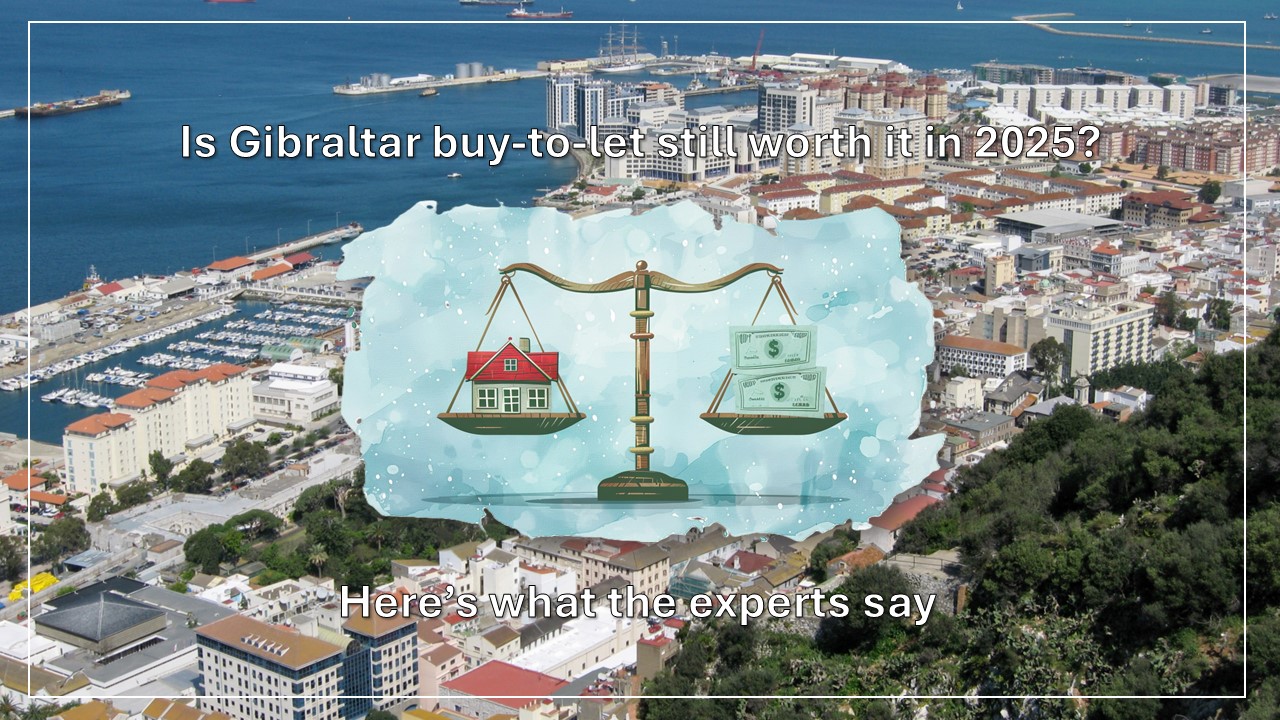Is Gibraltar Buy-to-Let Still Worth It in 2025? Here’s What the Experts Say
Economy | 24 Jun 25, 00:00

We spoke with real estate professionals, investors, and legal experts to understand the current state of the Gibraltar property market and whether BTL remains a worthwhile strategy in 2025.
Gibraltar’s Buy-to-Let Foundations
Gibraltar's appeal has always rested on a few core advantages:
No capital gains tax
No VAT
Low income tax rates
Robust legal framework based on English common law
Strong expat community and international business presence
Add to that a limited landmass—just 6.8 square kilometers—and it’s easy to see why property prices and rents have historically stayed buoyant.
“The shortage of housing stock in Gibraltar continues to underpin the market,” says Trevor Whitmore, a small-scale property developer. “We’re seeing consistent demand, especially from professionals in finance, gaming, and remote workers relocating from other parts of Europe.”
What’s Changed in 2025?
While Gibraltar retains many of its investment advantages, the environment has evolved significantly in recent years.
1. Interest Rates and Financing Costs
Global inflation pressures pushed central banks to raise rates from 2022 through 2024. Though stabilising in 2025, mortgage rates in Gibraltar—closely tied to UK and European markets—are now averaging 4.5% to 5.5% for BTL investors.
“Borrowing costs are up, and that puts pressure on yields,” notes local mortgage advisor Karen Rowe. “Cash buyers or low-leverage investors are in a better position now. Those heavily reliant on mortgages may find their net returns squeezed.”
2. Increased Supply of High-End Units
The last five years saw several large-scale developments come online—such as The Hub, EuroCity, and Midtown—offering hundreds of luxury apartments targeting high-earning tenants. While many have sold successfully, the influx has softened rental growth at the premium end of the market.
“We’re seeing more choice for tenants, especially in the studio to two-bed category,” says Paul Gibbens, Agency Manager at Richardsons. “Landlords are having to compete more on amenities, flexibility, and condition.”
3. Stricter Rental Regulations
Though Gibraltar remains landlord-friendly compared to mainland Europe, recent years have seen stronger tenancy protections and calls for more oversight. A draft rental code of conduct introduced in 2024 sets expectations for property condition, response times, and tenant communication.
“It’s still easier to manage a property here than in Spain or the UK, but the days of ignoring maintenance or charging premium rents for substandard flats are over,” continues Gibbens.
Rental Yields: Still Competitive?
Yields vary considerably depending on property type and location. According to 2025 data from local agents:
Studios and 1-beds in Ocean Village or EuroCity: Gross yields around 4%–5%
Older 2-beds in Main Street or Upper Town: Up to 6% if renovated
Short-term lets (where allowed): Potential for higher gross returns, but with more volatility
While these yields may seem modest compared to some parts of the UK or Spain, Gibraltar’s tax neutrality means landlords retain more of their gross income.
“You can’t just compare yield percentages in isolation,” says investor Maria Costa, who owns three rental units. “My properties in Manchester yield 7%, but after taxes, maintenance, and vacancies, Gibraltar gives me better net returns with less hassle.”
Who’s Still Investing in 2025?
Despite rising costs, several investor profiles remain active in Gibraltar’s BTL market:
High-net-worth individuals (HNWIs) seeking stable, low-tax income
Locals diversifying wealth into real assets
Remote-working professionals relocating post-Brexit
Overseas landlords—particularly from the UK, Israel, and Hong Kong—who value the territory’s legal structure and economic stability
“We’re seeing fewer speculative investors and more long-term wealth planners,” reports Whitmore. “Gibraltar isn’t about flipping anymore. It’s about yield stability and asset protection.”
Short-Term Lets: Still Lucrative?
Platforms like Airbnb and Booking.com have made Gibraltar an attractive destination for short-term rentals. With tourists, visiting business travellers, and yacht crews frequenting the Rock, short-term lets can offer gross returns up to 10%.
However, this part of the market is not without challenges:
Licensing requirements are becoming stricter
High turnover means more maintenance and management effort
Seasonal variation affects income predictability
“Short-term lets work best for landlords who are hands-on or who hire a reliable property manager,” says Martinez. “You can make more money, but it’s not passive income.”
Risks and Red Flags
As with any market, Gibraltar is not without risks in 2025:
Overdependence on finance and gaming: Any regulatory clampdowns in these sectors could weaken demand
Limited housing affordability for locals: This raises political concerns that could lead to rent controls or social housing expansion
Market saturation at the top end: High-end developments may face longer voids or falling rents if tenant demand softens
“It’s a resilient market, but not bulletproof,” cautions Gibbens. “Due diligence and a long-term mindset are essential.”
Final Verdict: Is It Still Worth It?
Buy-to-let in Gibraltar remains attractive—but only for the right kind of investor. It’s no longer a quick-profit play. Instead, it's best suited for:
Investors seeking long-term, stable rental income
Those valuing tax efficiency and capital preservation
Buyers with a strategic approach to tenant demand and property type
Landlords with low gearing or cash positions
“You need to view Gibraltar as a defensive investment, not a growth rocket,” says financial planner Fiona Ellington. “If you're expecting double-digit returns without work, you're looking in the wrong place. But for those with realistic expectations and a strategic plan, it still holds real value.”
Bottom Line?
Gibraltar’s BTL market in 2025 isn’t what it was a decade ago - but it remains compelling for well-informed, long-term investors. With a small, stable economy, strong legal framework, and limited land supply, the fundamentals remain solid. But gone are the days of easy gains. Success now demands due diligence, conservative financing, and a hands-on approach to tenant management.
As with any investment, it’s not just about where you buy - but how, and why. In Gibraltar’s evolving market, strategy is everything.
Get in Touch
For further information and advice on today's buy to let sector in Gibraltar, get in touch today.